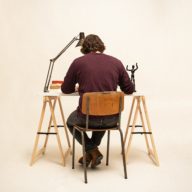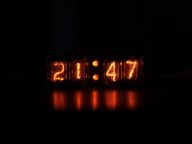They call it Foxwood Crescent.
Why, I don’t know. There aren’t any woods in the neighbourhood I grew up in and definitely no foxes—just the occasional stray cat and the ditch that flooded in the spring, full of tadpoles. Caleb and I used to play on the front lawn, brandishing swords made of cardboard, pretending that we were dashing through the undergrowth of the world’s greatest forest. We were pirates, or thieves, or knights. The chalk mazes we drew up and down the sidewalk became our realms. But in the end, when we stopped the game, we were just two kids on the hot pavement, searching the neighbourhood for something that wasn’t there.
I hear the echoes of our laughter on the day I return to Foxwood, and I still remember that silence that fell when our imaginations finally ran out. It’s like the moment after a sprint, when you double over, breathing hard, and suddenly realize how still the world is.
Ten years later, I still remember. I spent the last decade studying abroad, moving through foreign cities, trying desperately to avoid any reminders of the life I left behind. I know that I was running. But when you tire of fighting, that’s all you have left to do.
Caleb is already here when the cab drops me off at Foxwood, leaning against the stone marker that displays the name of the neighbourhood, but it takes me a second to realize that it’s actually him. He’s grown more than I have in the past ten years, and is in desperate need of a haircut.
I grip the handle of my bag and start towards him. We meet beneath the sign and I study him intently. Up close, he looks even more like a stranger. His eyes have that same intensity as they did when he was a boy, but now they are complemented by dark shadows and hollow cheeks.
Neither of us speaks for a long time, until Caleb clears his throat and says, “Hey.”
“Hey.”
“You, uh…” He gestures to my bag. “You want me to carry that?”
“I’ve got it.”
“Right.”
“Thank you, though.”
There’s nothing else to look at, so my eyes drift up the neighbourhood sign to the slogan. Foxwood: Where perfect lives begin.
It’s hard not to laugh.
Our life in Foxwood did begin perfectly, but childhood often has a habit of appearing that way. Caleb and I were both born here, raised in the little townhouse. We skinned our knees on the sidewalk out front, tumbled onto the grass as we clumsily learned how to ride bikes, and ate dripping popsicles on the porch with the sun beating down on us.
Dad often called us into the garage and taught us how to build model airplanes and fix the tires on our bikes, or he opened the hood of the car and let us look inside for as long as we wanted, smudging our fingers with grease. In the summer, Mom showed us how to fertilize and tend to the garden. We planted tomatoes, peppers, mint, and anything she could fit in the little soil patch. By the time evening fell, all three of us were often covered in dirt, grinning from the jokes and stories she told.
The garden belonged to Mom. That was why it was so strange when, on a late spring day, Dad told me and Caleb to come outside, and presented us with the sapling of a birch tree. When I asked him why he was suddenly interested in gardening, he only looked at me with a strange expression.
We planted the birch tree in a dirt patch by the driveway. It was tiny and frail, with delicate little leaves that looked like they might crumble away in a gust of wind. We knelt on the grass, holding it up as Dad lowered it into the ground.
“There,” he said. “This is for you to take care of, just like you have to take care of each other. Every time you see it, remember that you also have to help each other grow.”
He took our hands and guided them to the dirt, packing it down around the birch tree.
“Understand?”
We didn’t, but we nodded. I remember wondering why he was telling us that, and why he looked so sad, kneeling on the grass. But I didn’t ask, and when the sun disappeared, we went inside to bed.
Late that night or early the next morning, I awoke to the sound of a car engine. I climbed out of bed and pulled back my curtains to see Dad’s car backing out of the driveway. I thought, for a moment, that he might look up and wave at me. But he wasn’t facing forward, or looking over his shoulder like he usually did when he drove in reverse. He was staring at the birch tree.
I watched as his headlights slowly faded into the darkness beyond Foxwood, and I stood there even after they disappeared, until I was too tired to stay awake any longer.
The next morning I asked Mom where he had gone, and when he would return. She just looked at me strangely and said, “Eat your breakfast, or you’ll be late for school.”
I didn’t think much of it during the day, but when we returned from school that afternoon and he still wasn’t home, I questioned my mother again. When she brushed me off a second time, I shouted and screamed, and she sent me to my room. I stayed there for hours, staring out the window at the empty driveway, until someone knocked on my door.
It was Caleb.
“Come on,” he said. “We have to water the tree.”
That was the beginning, but it went on like that for years. The longer Dad was gone, the worse it got. Mom withdrew from us almost entirely. She stopped cooking, stopped cleaning, stopped packing our lunches or even waking us up for school. While she used to read and paint and play the piano, now she spent more and more time in her room, sometimes staying there for days in the dark. The garden was overgrown. Caleb and I split up what needed to be done, and we did it.
When the money started to run out, I picked up the phone and called our grandmother, who we’d only met once. She seemed surprised to hear from me. She didn’t offer to come over and help out, but when I explained the situation to her, she sent us a cheque in the mail, and together, Caleb and I did our first grocery run.
On top of school, which started to slip lower and lower on our list of priorities, and attempting to keep the house running, we took care of the tree. We watered it faithfully, checked it each day for damage, and measured it at the end of every week. Caleb drove a stake into the ground beside it to protect it from the wind, but after a year it was strong enough to stand on its own. I’ll admit that we almost neglected it, but Caleb said, “We have to take care of it. So it will be strong when Dad comes back.”
Looking back, it was strange how desperately we clung to that tree, to our desire for it to grow. Somehow, I think we both believed that if the tree was thriving, then we had hope for ourselves, too.
In the next few years, the branches spread out, thin but sturdy. In the spring, the leaves became a canopy, glistening with dew in the morning sunlight, and by evening, the white bark was bright against the falling dusk. No matter the time or season, the birch tree always called our attention towards it.
And it was perfect.
It was hard, but as we got older, we managed to scrape by as best we could. Mom emerged from her room occasionally, and sometimes she even got dressed and went out to meet with friends, but it was always followed by days of darkness. No matter how much we begged and pleaded, she didn’t even look at us. We were invisible.
So Caleb and I depended on each other instead.
The tree was taller than both of us by the time I was eleven, Caleb thirteen. I don’t remember the exact date, but I’m sure I could check the hospital records and find out. It was sometime in early August, and I walked upstairs to our mother’s room with a tray of pasta that Caleb had made. I opened the door, not bothering to say hello, and went to wake her.
I don’t remember it clearly.
It comes in flashes: I saw her on the ground beside the bed, surrounded by orange bottles. I dropped the tray, and though it didn’t break, I heard a tremendous shattering sound. The part I remember most vividly is my own voice, screaming for Caleb.
After that there were phone calls, and sirens, and people asking me questions I didn’t understand, and hours passed until I found myself on the porch, with Caleb sleeping beside me. My grandmother was talking to me.
“… can stay with me,” she was saying. “But I can’t take both of you. They’ll find a place for Caleb, I suppose…”
I wasn’t listening. The only thing I could focus on was the birch tree, standing still and quiet amid the flashing lights of the police cars. I had convinced myself that if we could just take care of it, if we could just make it grow, then everything else would be okay, too. I stared at the perfection of the branches, the strength of the trunk, the delicate curl of the leaves as they taunted me. A bitter taste filled my mouth.
It had never been a promise. It was a farewell.
I shrugged Caleb off my shoulder and stood up, despite my grandmother’s protests. I walked between the police cars to the shed, pulled out my father’s old axe, and stalked towards the tree.
The first swing nearly tore my arm from its socket, but I didn’t stop. I didn’t care that the handle sliced my palms or that the chips of broken bark flew at my face. All I wanted was for the tree to match the rest of my life—to be as damaged as we were.
Someone managed to stop me and wrestle the axe away. It must have been Caleb. I remember sobbing into his shirt.
They put us in two different cars. My grandmother looked at me in the rearview mirror. “You’re bleeding.”
I feel as if I’ve been bleeding ever since.
I feel it now, ten years later, as Caleb as I slowly walk up the hill towards the house, our hands in our pockets. It’s the middle of the day, so the street is mostly empty of cars, but there are children playing hopscotch on the corner. One of them has a bleeding knee, but she doesn’t seem to notice.
“It’s changed,” Caleb says.
“So have we.”
Apparently, they couldn’t sell the house after our mother died. My grandmother dealt with everything and left the property to me and Caleb in the event of her own death, which was two weeks ago. I got the call in the middle of my first class of the day, and I tried to convince the lawyer that there was no need for me to actually be present for them to deal with the house, but she said that it was up to Caleb and I to sort out the contents. And so we returned.
We stand at the end of the driveway, which has long since been cracked by the summer heat, and just look at the house. The gables are the same colour, though the paint is peeling, and the streaked window panes still appear to hold glimpses into our lives. I stare at my old bedroom window for a long time, unable to shake the image of myself, sleepy and confused, watching a car disappear.
“Look,” Caleb says, pointing to the lawn.
I didn’t notice it at first, but now my breath catches. The birch tree stands, mangled, scarred, but tall and blooming with spring leaves. I start towards it and stumble on the curb, my hands pressed against the scarred knots, and I realize then.
I was wrong when I was a child, convincing myself that the perfection of the tree could somehow balance the destruction of our lives. I was wrong when I was older, too, and I tried to destroy it, thinking that the world could be perfect or dead, and nothing else.
The scars of the tree are stiff beneath my hands, but it’s still growing.
Caleb joins me. We stand there for what seems like ages, leaning on the birch, and the sun burns fiercely above us.
Author’s Note:
I don’t need to tell you that life is never perfect. We get hurt, we get damaged, and sometimes it is difficult to see any beauty in the world around us. The goal of this story was to attempt to make sense of the hard parts of life, but also show that God is present in all things. No matter what happens to us, or what we do, God is able and willing to heal us and help us grow, even when we think we never will. The hurt of the past may be easily blurred in the ever-present glory and love of God.
This article was written as part of the Writing Mentorship with our P2C-Students Editorial team.
"*" indicates required fields




